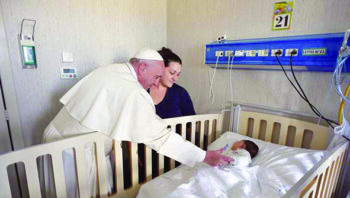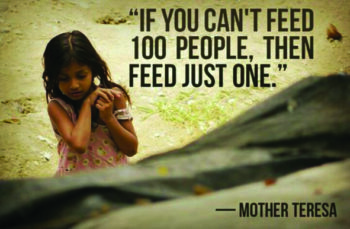The Corporal Works of Mercy
To change the world, we must be good to those who cannot repay us.
Pope Francis
In that short statement -- be good to those who cannot repay us -- Pope Francis is reminding Christians to act on and live out these seven corporal works of mercy.
1. Feed the hungry
The bible clearly states: “Feed the hungry, and help those in trouble” (Isaiah 58:10, New Living Translation). In most large cities it seems that there are more and more people begging on the streets. Some simply refuse to give while others hesitate, fearing that the money they give a beggar will be used to buy alcohol or drugs. This very issue was common several centuries ago and was addressed by the Polish Hasidic Rabbi, Chaim of Sanz (1793-1896). The wisdom he offered then continues to be applicable today: “The merit of charity is so great that I am happy to give to one hundred beggars, even if only one might actually be needy. Some people, however, act as if they are exempt from giving charity to one hundred beggars in the event that one might be a fraud”.
Furthermore, be aware that many who are hungry are often invisible in a society.
Recently, police were called to a home in Cornwall, Ontario, Canada, when a couple were heard arguing loudly. The police arrived anticipating a domestic violence call. However, they learned that the wife had dementia and her husband of 54 years was having difficulty caring for her and covering their necessities financially. The police discovered he had sold his wedding ring to buy groceries. When the officers learned this, they took up a collection among their colleagues. Together they raised $150 to help the couple purchase food and an extra $130 for the man to buy back his wedding ring.
2. Give drink to the thirsty
Though safe, reliable drinking water is readily available for those of us living in economically developed countries, this is not the case in many parts of the world. Here are some startling statistics according to www.water.org:
• one in ten people (= 660 million) lack access to safe drinking water;
• globally, a third of all schools lack access to safe water for children;
• in low and middle-income countries, a third of all health-care facilities lack a safe water source;
• every 90 seconds, a child dies from a water-related disease.
There are at least two ways to live out this second corporal work of mercy.
The first is to support with your voice, time and funds organisations which are working to bring safe water to people living in developing countries.
The second is evaluate your personal lifestyle, ensuring you are not wasting the valuable and limited resource of water. Dr. Robert Stackpole, STD, director of the John Paul II Institute of Divine Mercy offers this suggestion: “We can support clean water policies to ensure that there will be clean water for future generations to drink. Meanwhile, right in our own homes, we can make our contributions to the effort to preserve clean, fresh water: for example, by using environmentally friendly laundry detergents or by trying to be moderate in the amount of water we put on our lawns or use in showers”.
3. Clothe the naked
When considering this work, ask yourself these types of questions:
• Why don’t I sort through my wardrobe and drawers, removing the many items I no longer wear, ones which are in good condition, and donate them to a clothing charity?
• What children do I know whose parents don’t have enough money to buy them new clothes for school? Can I offer to make the purchases, or simply give them the money to do so?
• When I go shopping for new clothes, why don’t I buy additional clothing and give it directly to someone who is homeless?
Mother Teresa of Kolkata used this approach to guide a volunteer at her mission. In her book My Life For The Poor, Mother Teresa tells of a wealthy Indian woman who worked alongside her. The woman confided in Mother Teresa that she loved beautiful saris and purchased them at great cost. In fact, the one she wore that day had cost eight hundred rupees. This was in sharp contrast to Mother Teresa’s sari, which cost eight rupees. The woman bought a new, expensive sari every month. Mother Teresa wrote that she prayed about how to respond to this woman’s spending. Mother Teresa made this suggestion to the woman: “Next time, when you go to buy a sari, instead of buying a sari for eight hundred rupees, buy a sari of five hundred rupees, and with the remaining three hundred you buy saris for the poor people”.
The woman readily responded and even began buying her own saris as low as one hundred rupees so she would have more money to help clothe additional women.
4. Shelter the homeless
“Share your food with the hungry and open your homes to the homeless poor. Give clothes to those who have nothing to wear, and do not refuse to help”, -- God speaking through the prophet Isaiah (58:7, Good News Translation). The reason for this biblical call to action is because shelter is a basic requirement of life and, for many individuals, the line between being in a home and being homeless is a thin one.
Homelessness can occur suddenly when a job is lost, when illness strikes or when a spouse dies. Whatever the reason people find themselves without shelter, this work of mercy calls for response.
One person whose life was changed when he reached out to a homeless person was Gene Estess, a prosperous Wall Street investor.

On an evening after work, as he made his way through New York’s Grand Central station to take the train back to his suburban home, he noticed a reclining woman with a black poodle among the many homeless people who were inhabiting the station. The image made such a powerful impression that the next evening he introduced himself to the woman, who said her name was Patricia and her dog’s was Ebony. Speaking in a soft, gentle voice the woman asked Estess if he wanted to see her notebooks, which contained sketches she drew. Estess looked at notebooks filled with scrawled drawings which he recognised as symptomatic of schizophrenia.
He gave her some money and began searching for permanent housing for Patricia who was mentally ill, addicted and homeless. The search took him to the Jericho Project, a Manhattan based non-profit organisation. They placed Patricia in a home and invited Estess to serve on their board. Three years later, Estess left his well-paying position on Wall Street to become executive director of the Jericho Project at a tiny fraction of his former salary, a position he held for nearly two decades before retiring.
5. Visit the sick
Like the poor, the sick are always with us. Because illness is such a pervasive reality of life, Christians have ample opportunities to put their faith into action. This is the basis for this fifth work of mercy, to visit the sick. However, illness, especially one which is life threatening, often frightens people away. Addressing this fear, Stan Goldberg, author of Leaning Into The Sharp Points: Practical Guidance and Nurturer Support for Caregivers, advises educating oneself about visiting the sick, developing skillful behaviors, and overriding fears connected to such a visit. “Don’t be afraid to fail when you try to help”, Goldberg says. “Your loved one or friend will appreciate your efforts and will provide feedback if you give them permission. Use statements such as ‘If I do something that isn’t helpful, please tell me’. Less than skillful behaviour is appreciated more than no action”.
6. Ransom the captive
Historically, this corporal work was applied toward people who were captured and taken away as slaves and hostages. One Christian who set 8,000 slaves free using her own financial inheritance was St. Melania the younger (383-439). However, as slavery came to be legally abolished in most of the world, this corporal work has been re-interpreted to Visit The Imprisoned as taught in the bible: “Continue to remember those in prison as if you were together with them in prison, and those who are mistreated as if you yourselves were suffering” (Hebrews 13:3 New International Version). Pope Francis often visits those in prison. During Lent in 2013, he moved the Lenten foot washing ceremony from its traditional setting, the Basilica of St. John Lateran, the official seat of the bishop of Rome, to Casa del Marmo, a centre for young offenders. There, he poured water over the young offenders’ feet, wiped them with a white towel and celebrated Mass with them. There are a number of ways one can fulfill this corporal work of mercy including: regularly visiting prisoners, corresponding with them as a spiritual friend, organising a prison ministry in the parish or diocese, becoming involved in educational classes provided in jails and penitentiaries, supporting prison ministries financially, and promoting employment opportunities for prisoners after their release.
7. Bury the dead
The inspiration for this seventh corporal work comes from the Book of Tobit, a Jewish writing describing the plight of Jews who had been taken as slaves by Shalmaneser, an Assyrian king. Among them was a devout man named Tobit who offered this personal account: “In the days of Shalmaneser I had performed many charitable deeds for my kindred, members of my people. I would give my bread to the hungry and clothing to the naked. If I saw one of my people who had died and been thrown behind the wall of Nineveh, I used to bury him” (Tobit 1:16-17).
This custom of offering a final kindness by burying the dead became an important part of Judaism and was one extended to Jesus by Joseph of Arimathea, who requested permission to take the body of Jesus, prepare it with traditional funeral ointments, clothe it and then place it in his family tomb.
A modern way in which this continues to happen takes place when someone steps forward to pay funeral expenses for a family unable to do so, or when friends establish an online account receiving donations to help offset funeral costs.
As you go about your daily routines and responsibilities, remain open to the many ways life presents you with opportunities to live out and act on these seven corporal works of mercy.


 Entries(RSS)
Entries(RSS)